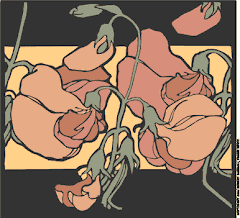The play I'm writing is Bred in Your Bones, a retelling of the life of my great grandfather Daniel Maloney. He was a gunrunner in the Irish War of Independence and fought on the Anti-Treaty side in the following Civil War, immigrated to Canada in the late 1920s. I did meet him when I was young, but very young, there is a picture of him holding me at almost a month old. He passed away about a week after the picture was taken.
It's a joy to be telling his story, the idea for the play has been mulling around my mind for sometime and his life has always inspired me. But currently I am stuck, which is annoying. I've focused in one why I want to write this play, its focus and yet...I'm finding the outline difficult. But I must remain positive and push through, and write. For NAPLWRIMO I must have the first draft finished by the end of the month. I can do this, I can do this, I really can.
The following is from Margaret Atwood's "Negotiating with the Dead/A Writer on Writing"; talks about it mainly from the point of view of a novelist but it pertains, I think to all writing:
"Specificially, I asked novelists , and I asked them what it felt like when they went into a novel. None of them wanted to know what I meant by into. One of them said it was like walking into a labyrinth , without knowing what moment might be inside; another said it was like groping through a tunnel; another said it was like being in a cave-- she could see daylight through the opening, but she herself was in darkness. Another said it was like being under water, in a lake or ocean. Another said it was like being in a completely dark room, feeling her way; she had to rearrange the furniture in the dark, and when it was all arranged the light would come on. Another said it was like wading through a deep river, at dawn or twilight; another said it was like being in an empty room which was nevertheless filled with unspoken words, with a sort of whispering; another said it was like grappling with an unseen being or entity; another said it was like sitting in an empty theatre before any play or film had started, waiting for the characters to appear. Dante begins the Divine Comedy-- which is both a poem and a record of the composition of that poem-- with an account of finding himself in a dark, tangled wood, at night, having lost his way, after which the sun begins to rise. Virginia Woolf said that writing a novel is like walking through a dark room, holding a lantern which lights up what is already in the room anyway. Margaret Laurence and others have said that it is like Jacob wrestling with his angel in the night-- an act in which wounding, naming, and blessing all take place at once. Obstruction, obscurity, emptiness, disorientation, twilight, blackout, often combined with a struggle or path or journey-- an inability to see one's way forward, but a feeling that there was a way forward, and that the act of going forward would eventually bring about the conditions for vision-- these were the common elements in many descriptions of the process of writing. I was reminded of something a medical student said to me about the interior of the human body, forty years ago: 'It's dark in there.'
Possibly, then, writing has to do with darkness, and a desire or perhaps a compulsion to enter it, and, with luck, to illuminate it, and to bring something back out to the light. This book is about that kind of dark, and that kind of desire."
Wednesday, November 7, 2007
Subscribe to:
Post Comments (Atom)


No comments:
Post a Comment